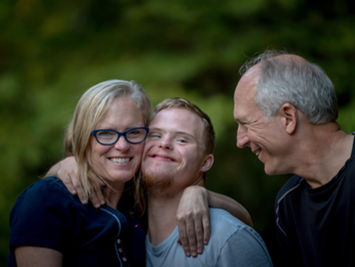
Accessible Family Vacation Planning Guide: Tips for Traveling with Special Needs
Planning a vacation with a family member traveling with special needs? Our comprehensive guide ensures a seamless and enjoyable trip for everyone. From consulting with doctors to leveraging resources like TSA Cares, we cover it all. Discover accessible destinations and get tailored advice for a stress-free experience. Traveling with special needs doesn't have to be daunting—let us help you create cherished family memories.
Here are some tips for traveling with a family member with special needs:

1. Plan Ahead
Map out your trip and select destinations and rest stops that can accommodate your loved one’s needs. Consider mode(s) of transportation you will be using and what special equipment you use at home that you’ll need. Things that maybe you might not need as much at home but would help make the trip more enjoyable like special auditory equipment for tours.
If your loved one uses oxygen or c-pap, you’ll want to know all of the rules and regulations for your mode of transportation.
Also, consider the time of year you are traveling. If someone in your family is on the spectrum and gets overwhelmed with large amounts of people, traveling during Spring Break may not work well.
2. Ask the Right Questions
When a hotel room says accessible, what does that really mean? Make sure the room you request is the one that will fit your needs. And what about other parts of the hotel, how accessible are they?
For those with food allergies, how will the resort or hotel kitchen handle those? Can you bring your own food for those on very specialized diets. Do they have medical staff on board the cruise ship or at the resort 24/7?
3. Use Your Resources
Your first resource is your Travel Advisor. But you have other resources to utilize both before and during your trip as well. If flying from the US, you’ll want to talk to TSA Cares for any concerns you have about you or your loved one going through the screening process. They are there to make that as easy and dignified as possible.
Many resorts and cruise lines will have a special needs department where you can ask questions ahead of your trip and during your trip, they will help you should something not go according to plan. For larger resorts, they are usually your go-to for activities for your special needs child.
4. Consult a Doctor
Before you get too far in your planning, consult with your loved one’s doctor. Is it ok for them to travel? Is there a good hospital where you are going should something happen? Do you have standing lab orders for your loved one that you will need to bring?
Make sure you have a list of medications and allergies (including doses and reaction type). A physician’s letter stating your child or loved one’s condition and their contact info in case of an emergency is a great thing to have. Formulating a medical plan before your vacation is crucial.
Talk to any DMEs about getting equipment or refrigerated meds sent to your destination if possible, though you’ll always want at least a few days on hand when you depart.


5. Buy Travel Insurance!
With anyone with any kind of developmental disability, or medical disability or even elderly, there is a higher chance that someone is going to get sick and not be able to travel or worse, get sick during the trip and have to interrupt your vacation. The best thing you can do for your family is to purchase travel insurance.
6. Schedule and Pack Accordingly
Keep your schedule loose and expect to need some downtime. Especially for those on the spectrum, a vacation can be overwhelming. Pack all of their favorite toys, sensory items, and storybooks and know what resources your cruise ship or resort hotel has to offer.
7. Don’t Expect Perfection!
Especially if it’s your first vacation together, there will be curve balls, there may even be tears but those will dry!
Travel is a learning experience for all in your family and something that helps to create lasting memories. So don’t let fear stop you from planning your accessible family vacation!
Tara is the mother of two adult children with mental, cognitive, and physical disabilities and has been featured in the book Traveling Differently as a Certified Austism Travel Professional and parent.





